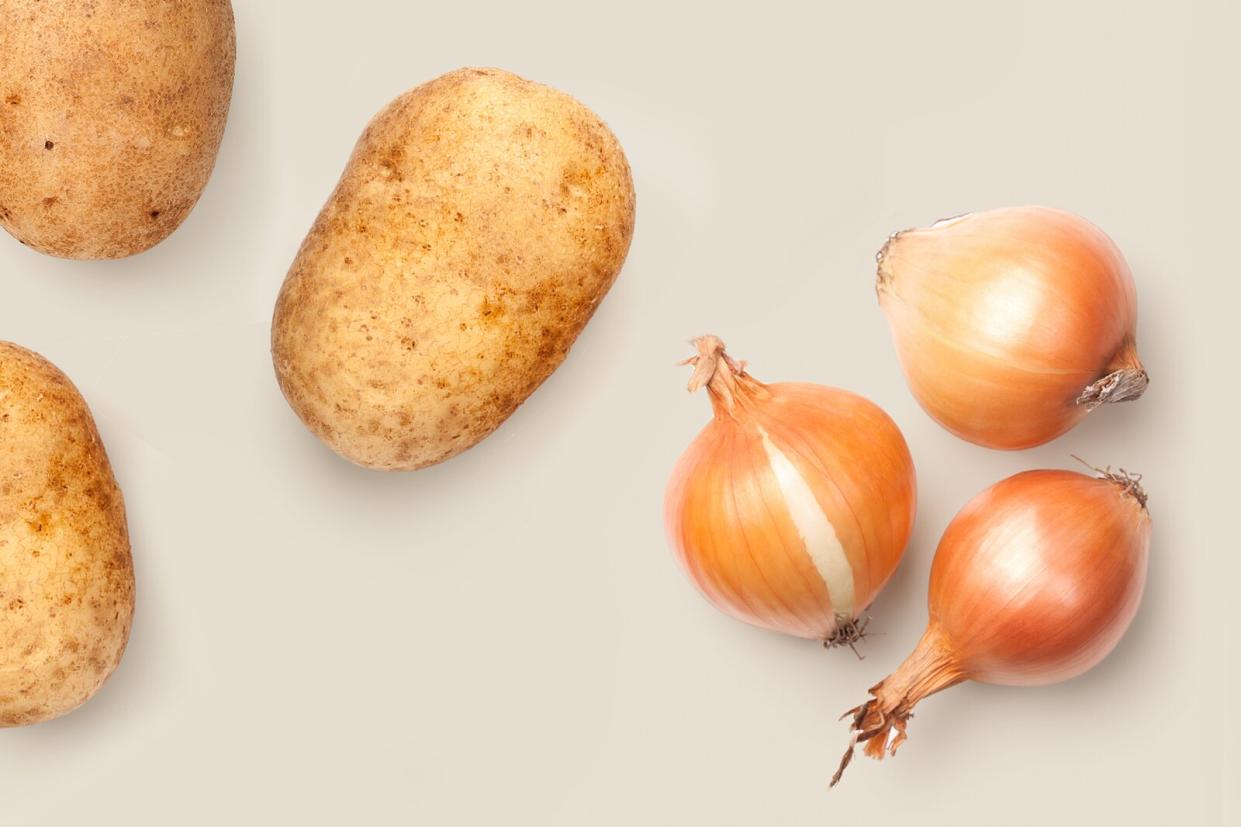Why You Should Never Store Onions with Potatoes—Plus, Other Fruits and Vegetables That Don't Go Together

Bozena_Fulawka / Getty Images
TABLE OF CONTENTS
On This Page
Onions, Apples, and Potatoes
Melons
Cauliflower, Apples, Kiwis, and Onions
Mushrooms
Using Your Crisper Drawer
Ethylene Producers vs. Ethylene Sensitive Produce
Reducing food waste is always a good idea, especially when a few easy at-home shifts can help cut down grocery bills and help our environment. One way to do just that? Knowing which fresh produce items can be safely stored together—and what fruits and vegetables should never be too close. Heeding our tips will prevent your apples from smelling like onions, stop your fruits from ripening too quickly, and get rid of moisture that turns fresh lettuce to mush.
Related: Should You Refrigerate Lemons?
Keep Onions Away from Apples and Potatoes
Ultimately, understanding which types of produce can and can't safely be stored near each other will maximize your foods' longevity. "In general, don't store ethylene-sensitive fruits or vegetables with fruits or vegetables that produce a high amount of ethylene gasses," says John Adler, the vice president of culinary at Blue Apron. "Probably the best example of this is storing onions with apples—you will end up with onion-scented apples!—and more commonly, onions with potatoes. Storing onions and potatoes together will hasten the ripening process on the potatoes, leading them to grow eyes and sometimes roots." This goes for garlic, as well, despite the fact that potatoes, onions, and garlic should all be housed in a cool dark place.
More Apple Storage Tips
As for some other fast facts to know about storage apples? Don't place them in a bowl with other fruits—they can be stored on the countertop, but because they emit lots of ethylene gas, aim to keep them at least 6 to 8 inches away from other fruits and vegetables. Consider putting a bowl of apples on a coffee table, hutch, or entryway station to keep your apples safely away from ethylene-sensitive produce.
There's one exception to this: If you want to quickly ripen countertop fruits, like bananas, "putting them closer to apples on the counter will help them ripen faster," says Adler.
Store Melons Solo
Like apples and bananas, melons produce ethylene, which can lead to the over-ripening of nearby produce. Melons are typically best stored on your countertop, until they are ripe enough to cut, eat, or store in sealed packages that will protect the fruit itself and its nearby neighbors in the fridge.
Keep Cauliflower Away from Apples, Kiwis, and Onions
Cauliflower is a vegetable that belongs away from most fruits and alliums. "Cauliflower is very ethylene sensitive, so it is best not to store it in the same drawer as apples, melons, kiwis, or onions," says Adler. It needs air circulation to stay fresh, so if it's in a punctuated plastic bag, feel free to keep it in tact. If your cauliflower is in a a plastic or compostable produce bag, make sure the top is open so it can breathe. It keeps best in a refrigerator drawer with other vegetables—or on a shelf. The same goes for broccoli, cabbage, and Brussels sprouts, all of which are sensitive to ethylene.
Place Mushrooms Away from Pungent Foods
While they are technically a fungus—not a fruit or vegetable—most of us consider mushrooms produce, and we generally store them with other produce iterations in the refrigerator. But our favorite fungi are susceptible to absorbing odors from smelly foods nearby, like leftover takeout, so take care to store them near less pungent options in the refrigerator.
Ultimately, it's best to store mushrooms in a paper bag; this lets the mushrooms breathe, prevents contamination, and should also absorb excess moisture to prevent the mushrooms from spoiling. Change the bag if it feels wet or flimsy, and make sure any moist bags aren't in close contact with other produce.
Use Your Crisper Drawer
Keeping vegetables in your crisper drawer is the key to extending their freshness. "The biggest thing that will spoil vegetables quickly is excess moisture and temperature abuse, so you want to store vegetables in a crisper and make sure they are dry," says Adler. Control both, he says, before you place food in the crisper drawer.
Temperature Control
Lay vegetables that become warm in your car or in a tote on the way home from the farmers' market flat and allow them to return to room temperature before you move them to their new home in your vegetable drawer, says Adler. This ensures that the vegetables won't condensate as quickly and make the rest of the produce in your fridge moist and spoiled.
Moisture Reduction
"Greens are best washed, well dried, and then stored with layers of paper towels [between leaves] to prevent condensation from causing damage," says Adler.
Separate Ethylene Producers and Ethylene Sensitive Produce
When in doubt, or if you're low on storage space, the most important element of fruit and vegetable storage is to separate ethylene producers from their sensitive produce relatives (see the below chart for a comprehensive list of produce items that should never be stored together).
Note that there are some fruits that aren't sensitive to ethylene, such as citrus; they can be stored with ethylene producers if space is tight. Products, like storage containers and sheets, can help absorb ethylene in your crisper drawer to keep produce as fresh as possible.

